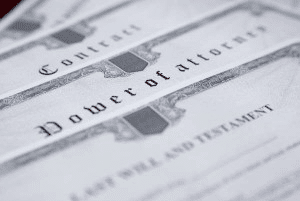There are many legal documents you can use to create your estate plan. Far too many people, however, think their estate planning work is done after writing a will. This is unwise, however: a will may be the central document of an estate plan, but it doesn’t cover everything. Some of the more common documents or legal devices used in New York for estate planning purposes include living wills, healthcare proxies, trusts, power of attorneys, and life insurance. A comprehensive estate plan will include most of these documents. If you’re beginning to make end-of-life plans, it will help to learn more about these estate planning tools.
Download Our Free Estate Planning Guide
Last Will and Testament
 A last will and testament is a legal document that sets out how you want to distribute your assets after you die. This can be as specific or as general as you’d like – either assigning portions of the value of your entire estate, or giving specific items to specific individuals. It’s extremely unwise to neglect writing a will. If you pass away without a will, New York State intestacy laws will determine the division of your assets, which could result in scenarios you never would have wished – such as assets going to people you never met.
A last will and testament is a legal document that sets out how you want to distribute your assets after you die. This can be as specific or as general as you’d like – either assigning portions of the value of your entire estate, or giving specific items to specific individuals. It’s extremely unwise to neglect writing a will. If you pass away without a will, New York State intestacy laws will determine the division of your assets, which could result in scenarios you never would have wished – such as assets going to people you never met.
There are limitations to the powers of a will, though. All assets named in a will are subject to probate, the legal process of “proving” a will, and an opportunity for certain dissatisfied parties to challenge a will. Probate often proceeds without issue, but if there is a challenge, it could be time-consuming and expensive for your loved ones. If you have a will, your designated executor will handle the probate process, and your trustee will manage or distribute the estate afterwards.
There are restrictions on what you can do with your assets through a will. You cannot disinherit a spouse, for example. In New York, a spouse is entitled to a “right of election,” equal to at least $50,000 or one-third of an estate. The only exceptions are in cases of abandonment, a pending divorce based on something like infidelity, or where there is a legitimate prenuptial or postnuptial agreement.
Living Will
 A living will, sometimes referred to as a document directing health care or an advanced healthcare directive, allows you to set forth instructions explaining your healthcare wishes, setting forth what medical care you are to receive and under what circumstances, should you be unable to communicate those decisions yourself.
A living will, sometimes referred to as a document directing health care or an advanced healthcare directive, allows you to set forth instructions explaining your healthcare wishes, setting forth what medical care you are to receive and under what circumstances, should you be unable to communicate those decisions yourself.
If you know you suffer from a certain condition – such as a risk of heart attacks – you can dictate very specific instructions. However, you can’t predict every scenario. Your living will should also set down general principles.
Health Care Proxy
 If you have a living will, it is also a good idea to establish a healthcare proxy (or agent). This person can make decisions about your healthcare if you are incapacitated. Your living will can guide the healthcare proxy’s choices, but most importantly, this person will be able to act in unforeseen circumstances.
If you have a living will, it is also a good idea to establish a healthcare proxy (or agent). This person can make decisions about your healthcare if you are incapacitated. Your living will can guide the healthcare proxy’s choices, but most importantly, this person will be able to act in unforeseen circumstances.
It is not enough to pick someone you “trust” to be your healthcare proxy. There are different kinds of trust. You might trust one person with your finances and another person with your children. You should trust your healthcare proxy to understand the ramifications of different healthcare decisions; to understand your moral, religious, and philosophical beliefs; and to be capable of making life-and-death decisions under pressure.
Download Our Free Estate Planning Guide
Trust
 A trust is an arrangement where someone (the trustee) controls property for the benefit of another person (the beneficiary). One of the biggest advantages of having a trust is that it can keep your assets out of probate court.
A trust is an arrangement where someone (the trustee) controls property for the benefit of another person (the beneficiary). One of the biggest advantages of having a trust is that it can keep your assets out of probate court.
You might establish a trust for your young children. The trustee would administer those assets until your children reached the age of 21.
You might also set up a “living trust,” which you could administer yourself. This takes assets “out” of your estate and puts them in a trust that you manage. As both grantor and trustee, the assets are not “yours,” but you can use them as you like. When you pass away, control of the trust passes to the party that you name. Living trusts are revocable and amendable, meaning that you can change their terms or dissolve them entirely should you wish.
Power of Attorney
 Signing a power of attorney gives someone authority to handle your affairs. You could think of it as making it easier for people to help you. A standard power of attorney includes specific lists of powers from which to choose. For instance, an individual with power of attorney over your bank account will be authorized to pay bills and write checks, but not to sell your house – unless you name that power. Today, most spouses give power of attorney to each other.
Signing a power of attorney gives someone authority to handle your affairs. You could think of it as making it easier for people to help you. A standard power of attorney includes specific lists of powers from which to choose. For instance, an individual with power of attorney over your bank account will be authorized to pay bills and write checks, but not to sell your house – unless you name that power. Today, most spouses give power of attorney to each other.
You can always revoke power of attorney, unless you are mentally incompetent. In that case you can neither sign nor revoke power of attorney.
When selecting someone to whom you’ll grant power of attorney, you’ll want to look for the same qualities you would in an executor. You want someone who “takes care of business.” You might consider Benjamin Franklin’s adage: “If you want something done, ask a busy person.”
Life Insurance
 Life insurance works by having an insurance company pay out a sum of money to a beneficiary when the individual insured under the policy dies. In return for this promise, the insurance company receives regular payments in the form of premiums.
Life insurance works by having an insurance company pay out a sum of money to a beneficiary when the individual insured under the policy dies. In return for this promise, the insurance company receives regular payments in the form of premiums.
Life insurance premiums will vary depending on the health of the person seeking insurance. Different policies also come with many exclusions that you should review carefully before making a decision. Before signing any life insurance policy, you must consult with an experienced estate planning attorney.
End-of-life empowerment with estate planning
 As we near the end of life, we’re reminded of all the things we cannot control: the ageing process, the flow of time, the inevitability of death, and in some cases even our bodies and our minds. However, we can exercise a great degree of control over what will happen to our bodies and our possessions when we become incapacitated or when we pass away, ultimately easing the impact of our deaths on our loved ones, and contributing materially toward their future happiness and financial wellbeing. It’s important, then, to understand exactly what you can control, and to exercise that power before it’s too late.
As we near the end of life, we’re reminded of all the things we cannot control: the ageing process, the flow of time, the inevitability of death, and in some cases even our bodies and our minds. However, we can exercise a great degree of control over what will happen to our bodies and our possessions when we become incapacitated or when we pass away, ultimately easing the impact of our deaths on our loved ones, and contributing materially toward their future happiness and financial wellbeing. It’s important, then, to understand exactly what you can control, and to exercise that power before it’s too late.
The attorneys at Cole, Sorrentino, Hurley, Hewner & Gambino P.C. have been representing Western New York clients for over 45 years. As an experienced estate planning attorney in Buffalo NY, Thomas F. Hewner has helped successive generations plan ahead, choose the right estate planning tools and documents for their respective situations, and achieve peace of mind in their final years.
Contact us today to set up a consultation in one of our five area offices: Buffalo, Batavia, Hamburg, Cheektowaga, and Niagara Falls. In the meantime, you can continue to explore our legal resources.
Download Our Free Estate Planning Guide

Great Post Thomas!!! As a Lawyer it is very important to determine if an individual is lying or not..Thank you very much for sharing this detailed post ..It was very helpful and I really enjoyed reading it.
I had no idea that you couldn’t disinherit a spouse; I don’t plan to but it’s still interesting. My husband and I just had our first child, and we want to be sure that she’ll be fine if something were to happen to us. Thanks for explaining these documents, now we’ll just have to find someone who will help us plan our estate.
It’s interesting to read about power of attorney and why it can be so crucial for some situations. It makes sense that power of attorney can solve a lot of issues for somebody who’s disabled, etc. My dad has a pretty serious sickness and while he has a good thing going for him right now, he never planned his estate effectively and there could be a lot of holes when it comes into play. Thanks for the information; you have a lot of great information here that could make it much easier for me to plan my estate but making sure my dads is handled effectively could be helpful right now.
My friend told me that she was left out of a will and I was curious to what it was. I didn’t know there were limitations to the powers of a will. That would be bad if there was a probate and you couldn’t get the assets from the will. That’s interesting to know. Thanks!
It’s great to know that there’s a lot to consider when planning estate documents, such as my last will and life insurance. I’m glad that I can seek professional help when I decide to acquire one for me or my family. Thanks for the easy explanation!
Thanks for this info. My parents are now old and want to settle matters. We are now looking up some lawyers to help them with planning their estates.
Thanks for the idea about establishing a trust for your young kids. My son is three, and my husband and I want to make sure that he can afford to go to college when he’s older. Maybe we should get an estate planning lawyer so he can have the money he needs when he grows up.
I didn’t know anything about living wills, nor that you can dictate specific instructions if you have a specific condition that can affect your health. I just had my first baby a couple months ago, so my husband and I have been thinking about creating a will. I’ll probably have to find an attorney to help us with the legal matters.
That’s interesting that you can consult with an estate planning attorney before signing a life insurance policy to make sure that it’s good. My husband and I will have our first child this winter and we started thinking about getting a will, life insurance, and everything that goes with that. We’ll have to look for an estate planning attorney to see what the best options for us are.